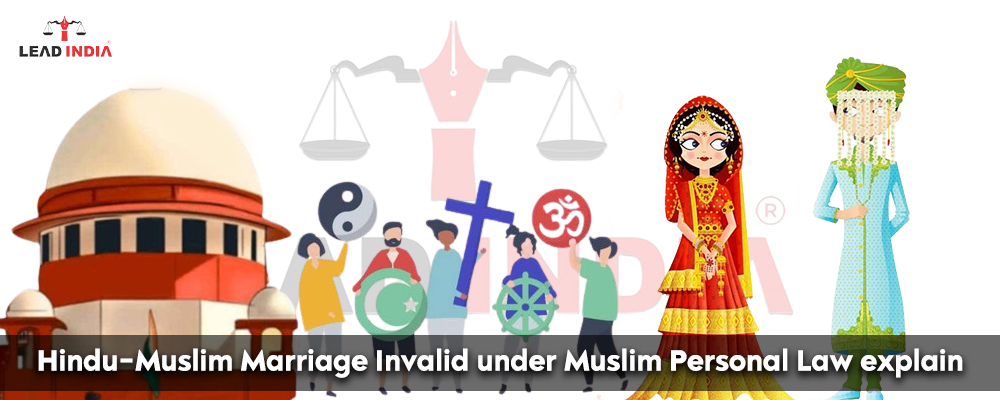Marriage is a social institution designed to sustain society while also protecting people from immorality and unchastity. Marriage implies wedlock. According to Shariat, the marriage of Nikah is a civil contract entered into by parties only for the aim of benefiting themselves. It is a method of legalizing a man and a woman’s cohabitation, and the children born from this union are legitimate. According to Islamic law, a marriage contract must not be proved in writing. A proper contract is needed for Muslim marriage.
Need A Legal Advice
The internet is not a lawyer and neither are you. Talk to a real lawyer about your legal issue

Hindu-Muslim Marriage Invalid under Muslim Personal Law
The Madhya Pradesh High Court ruled against extending protection to an interfaith couple seeking to marry under the Special Marriage Act of 1954, holding that under Muslim Personal Law, A marriage between a Hindu woman and a Muslim guy is considered invalid.
The court’s judgment was based on an interpretation of Muslim Personal Law, which considers the marriage of a Muslim man to a Hindu woman who worships an idol or fire to be invalid or irregular, classifying it as a “prohibited relationship”.
Marriage between a Muslim male and a girl who is an idolatress or a fire-worshipper is not considered acceptable under Mahomedan law. Even if they are married under the Special Marriage Act, a Muslim man and a Hindu woman’s marriage is considered “irregular” in Muslim law. Justice G.S. Ahluwalia said.
The court was considering a plea from a Hindu woman and a Muslim man seeking police protection so that they could securely meet with a marriage commissioner to register their marriage under the Special Marriage Act.
The SMA provides for the “registration” of weddings with a marriage officer, regardless of religious affiliation. However, the Act states that any marriage that falls within a “degree of prohibited relationship” cannot be solemnized under it.
The petitioners claim that, although being in love, they were unable to formalize their marriage under the SMA because they were unable to present themselves before the marriage officer due to an objection lodged by anonymous respondents in their petition.
They also expressed a desire to practice their own beliefs without interfering with others. The two further asserted that SMA, as a secular law, would overrule personal laws. However, the judge refused to accept this argument.
Wrong and faulty interpretation
Marriage is classified as a civil contract in Muslim law, with three types: legitimate marriage (sahih), irregular or invalid marriage (fasid), and void marriage (batil). Marriage to a deity or a fire-worshipper is not void or basil, but rather invalid.
According to the Supreme Court, a “Mahomedan male may contract a valid marriage not only with a Mahomedan woman but with a Kitabia—that is, a Jewess or a Christian—but not with an idolatress or a fire-worshipper.”
In the particular case, however, the MP HC stated that the Hindu woman did not plan to convert, and so the marriage would remain irregular, which cannot be legalized under the SMA because Muslim Personal Law would forbid the union.
The court also referred to Section 4 of the SMA, which states that marriages banned by personal law cannot be solemnized under this legislation. “If the parties are not in a prohibited relationship, only marriage can be performed,” the court explained, citing Section 4 of the Special Marriage Act.
The High Court also cited a 2019 Supreme Court decision to clarify the definition of an irregular marriage under Muslim law. However, the Supreme Court did not consider such a marriage to be a “prohibited relationship.”.
The 2019 Supreme Court opinion addressed the question of whether a child born from such an irregular marriage would be illegitimate. Holding it in the negative, the court ruled that the kid born out of this union would have regular legal rights.
Lead India offers free legal advice and online information, in addition to other legal services. We provide a forum to speak with a lawyer and ask legal questions. Lead India’s solicitors can help you with any legal difficulties. Lead India’s solicitors may assist you with any legal issues. Lead India also provides free online legal help in India. In addition to giving online legal assistance, Lead India allows users to ask specialist questions for free.





 Talk to a Lawyer
Talk to a Lawyer